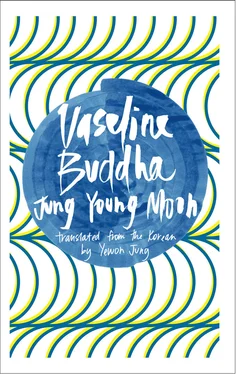I looked at the scene again and it was beautiful, and there was something about it that appealed to the heart, although I wasn’t sure exactly what it was. And when I pushed aside a branch of a bush that was slightly blocking my view, so as to get a better look at the stage of the Hundred Years War, I saw a fortress-like structure in ruins on a hill, which convinced me that a war had indeed taken place there long ago. The landscape that lay before me did, in fact, look like something that two countries would wage war over. (I also fancy that England and France went to war because the English couldn’t bear to think that the French ate on a daily basis delectable wine and cheese, which they themselves couldn’t eat, and wanted to keep the French from doing so, if not for anything else.) There must have been another reason, of course, for the war, one that was less romantic or lyrical, but I thought that waging a war so as not to let the opponent take possession of such a landscape, so as to take possession of it yourself, was quite reasonable as a reason for waging a war. And the region was famous as a grape and truffle producing district.
At any rate, people started many wars for ridiculous reasons, and did many ridiculous things even during wars. People of a certain period, thinking it would be advantageous to make spears as long as possible, did make spears as long as possible, and ended up being unable to even pick them up — they probably couldn’t fight with them, for they couldn’t even pick them up — and during the First World War, Italians, flaunting their remarkable fashion sense, made red uniforms that became easy targets for the enemy, reducing the chances of survival for their own youth. During a war, it’s possible to see an antiaircraft gun in someone’s garden, through laundry flapping in the wind, and in fact, it was possible to see such scenes at the time of the Pearl Harbor attack by the Japanese. Perhaps war is a stage that lets people do the most ridiculous things in the easiest way.
As I looked at the landscape before my eyes, picturing scenes from the past of people fighting, the herd of animals in the distance drew nearer. But I still couldn’t tell what the animals were exactly. I was pleased to think how I had been led to think about the Hundred Years War, and to watch a passing flock of animals with interest, on this short trip I took to see a girl I didn’t even know very well, who had rejected me.
In the meantime, things that were clear or unclear continued to appear and disappear, or stay, in clear or unclear forms, and I watched them without losing sight of them, or watched them, losing sight of them. And smelling pine leaves, I rejoiced a little, as if it brought me ineffable joy to smell, in a forest in a French countryside, the smell I’d smelled in a forest a long time ago in my childhood.
And a wisp of wind blew for a moment, and then it stopped. The wind seemed to blow, but then it didn’t. And when I took a deep breath and breathed out long and slow through my mouth, the wind didn’t blow as if my breath had stirred it up or anything. Nevertheless, the moment I thought that there was nothing I could do about this wind it began to blow, as if it had read my thought or was supporting it. Whenever the wind blew, I thought I had something to do with the wind blowing stronger, exhaling and adding breath to the wind.
And when the wind grew weaker, I exhaled more softly, and repeating the process, I recalled that I liked to treat objects as ideas, and ideas as objects, and thought that the wind seemed like some kind of an idea at that moment. Some ideas are sticky like ice cream melting in a child’s hand, and are fluid, being soft like a jellyfish, but other ideas are solid like a hammer and can be used to drive in a nail, and yet other ideas are fixed, like a nail that’s been driven in, and then there are things, such as certain birds that fly in a formation toward the equator or a polar region, that are ideas in themselves. (Endowing an idea with the shape and characteristics of an object, and coloring an object with an idea, is probably a task belonging to poetry, not fiction. I might be trying to make this become more like poetry than fiction.)
Thinking, This wind, at least, has a wavering belief, and is faithful to that belief which is bound to waver, I enjoyed the strange game with the wind, and soon got tired of it and forgot about the wind.
But looking at the grass, wilting in the midday heat and gently swaying in the wind, I recalled some thoughts about my existence that were deeply rooted in me, which were difficult to shake off, and it occurred to me that by thinking that the grass was wilting, I was inflicting injustice on the grass, and viewing it in an unjust light, so I withdrew my gaze, and the thought, and was about to root out the thoughts that were deeply rooted in me, which were difficult to shake off, but then stopped and let them take root even more deeply in me. And among those thoughts, the one that became the most deeply rooted was the thought that I was barely managing to stand, as if floating, on some kind of a foothold I couldn’t quite or ever touch, since it never existed in the first place, that there were no grounds for my existence anywhere, which had more than enough grounds in me, but was groundless in itself if you thought you had found the grounds for it. The idea that everything in existence existed by accident, that inevitability was only a part of a tremendous accident, was something I could never shake off, and made my life so difficult, and yet so easy.
As I looked at nature spread out before my eyes, it looked as if it were weary, or bored, of being nature, of having no choice but to be nature. By and large, nature made me feel at ease, but at that moment, it looked much too steeped in self-satisfaction, and I felt somewhat uneasy. And the question I’d long had on my mind of why nature always looked natural rose to my mind again. If nature held a power that made everything that was placed in it an inevitable part of itself, what kind of a power was it? And other questions naturally surfaced among my thoughts that seemed as if they would come to a stop, again and again, but didn’t. Were unnatural things something that only humans could create? Was nature, which seemed indifferent, obsessed with balance? Did nature not commit errors? Or was it free from errors? And was it because nature couldn’t be accused of errors, regardless of whether or not it was free from errors? Was nature free of responsibility, and could it not be held responsible for something? Was nature free of responsibility for everything, including itself? But could you say that something was free from errors because it couldn’t be accused of errors? Or could errors exist regardless of whether or not you could accuse something of them? (I wanted to continue on, in any way I could, with questions whose answers it was possible not to arrive at, perhaps because “the question marks weren’t placed deeply enough,” as someone said.) But was nature really natural? Why were some of the things that humans created not natural? Couldn’t it be said, in a broad sense, that everything humans created was also part of nature?
But, as always when I had such thoughts, I failed to obtain answers to the questions over which natural philosophers of old could have agonized. I thought that the earwig which I thought appeared before me at that moment, although it didn’t, and placed on my hand and watched as it stayed still, as if dead, after squirming for a while — the earwig, at that moment, represented nature — thoroughly ignored my question. So I became a little angry and wanted to mock and slander nature in any way I could, and thought that a modifier was necessary in order to do so, and said that nature was shabby, false, ashamed, squalid, squalid beyond measure, and above all, cruel beyond measure (I wanted to inflict injustice on nature through an excessive use of adjectives), but as could be easily predicted, I was the one, not nature, who was shabby, false, ashamed, squalid, squalid beyond measure, and above all, cruel beyond measure. So I harbored an ill feeling against nature, and thought that I could expose it without hesitation — I could, in this way, harbor an ill feeling against anything at all, and expose it without hesitation — but I just harbored it without exposing it.
Читать дальше












